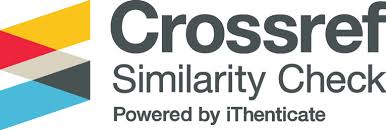Pengaruh Empowerment Dan Self Efficacy Terhadap Kepuasan Kerja Karyawan
(Studi Pada Ubud Inn Cottages di Gianyar)
Abstract
The purpose of this study was to determine the partial and simultaneous effect of empowerment and self-efficacy on job satisfaction of Ubud Inn Cottages employees in Gianyar. The population in this study were all employees of Ubud Inn Cottages in Gianyar as many as 51 people. The method of determining the sample is using a sample so that the population is used for the sample. After using the instrument test and classical assumptions, then the data analysis test was carried out using multiple linear regression analysis, determination, t and F tests. The results obtained that empowerment had a positive and significant effect on employee job satisfaction at Ubud Inn Cottages in Gianyar. Self efficacy has a positive and significant effect on employee job satisfaction. Empowerment and self-efficacy have a positive and significant effect on employee job satisfaction. The magnitude of the influence of empowerment and self-efficacy on job satisfaction is 57.3%. The leaders of Ubud Inn Cottages in Gianyar are better able to give full authority and trust to employees, can entrust the ability of employees to carry out their own work and pay attention to employee job satisfaction by rewarding the expected job satisfaction.
References
Akbar, A. et al. (2011). Impact of Motivation on the working performance of employees-A case study of Pakistan. Global Advanced Research Journal of Management and Business Studies, 1(4), 126–133.
Al Zu’bi, H. A. (2010). A Study of Relationship Between Organizational Justice and Job Satisfaction. International Journal of Business and Management, 5(12).
Ardana, dkk. (2012). Manajemen Sumber Daya Manusia. Graha ilmu.
Hasibuan, S. M. (2014). Manajemen Sumber Daya Manusia (Revisi). Bumi Aksara. Ismail, A., Mohamed, H. A.-B., Sulaiman, A. Z., Mohamad, M. H., & HanimYusuf, M.
(2011). An Empirical Study of the Relationship between Transformational Leaderships. Empowerment and Organization Commitment, Bussines and Economics Research Journal, 2(1), 89–107.
Lodjo, F. S. (2013). Pengaruh Pelatihan, Pemberdayaan Dan Efikasi Diri Terhadap Kepuasan Kerja. Jurnal EMBA, 1(3), 747–755.
Mahayasa, I. G. A., & Martayanti, N. M. P. (2020). Analysis Of The Influence Of Member's Commitment And Satisfaction On Loyalty Of Cooperative Members. Warmadewa Management and Business Journal (WMBJ), 2(1), 48-55.
Prasetya, D. (2013). Pengaruh Pelatihan dan Motivasi Kerja terhadap Kepuasan Kerja Karyawan (Studi Kasus pada Rumah Sakit Jiwa Daerah Surakarta). Universitas Muhammadiyah Surakarta.
Rachmawati, Y. E. (2012). Hubungan Antara Self Efficacy dengan Kematangan Karir Pada Mahasiswa Tingkat Awal dan Tingkat Akhir di Universitas Surabaya. Jurnal Penelitian Ilmiah.
Rivai, V. (2011). Manajemen Sumber Daya Manusia Untuk Perusahaan dari Teori dan Praktik. Raja Grafindo Persada.
Robbins, S. P., & Judge, T. . (2015). Perilaku Organisasi. Salemba Empat.
Siregar, N. Y., & Herlina. (2014). Mengukur Empowerment , Self Efficacy Dan Budaya Organisasi Terhadap KEPUASAN KERJA UNTUK MENINGKATKAN KINERJA PERGURUAN TINGGI SWASTA DI BANDAR LAMPUNG. 15–16.
Srinadi, N. M. E., & Netra, I. G. S. K. (2014). Pengaruh Pemberdayaan, Self Efficacy, Pengembangan Karier Terhadap Kepuasan Kerja Karyawan. E-Jurnal Manajemen Universitas Udayana, 3(7), 255–262.
Sugiyono. (2017). Metode Penelitian Kualitatif, Kuantitatif, Dan R&D. Alfabeta.
Tilaar, R. (2014). Analisis Komitmen Organisasi, Pengembangan Karir dan Pemberdayaan Terhadap Kepuasan Kerja Pada Kantor Badan Pengelola Perbatasan Kepulauan Sangihe. Jurnal EMBA, 2(3), 991–1000.
Ubaidillah, M. H. (2014). Pengaruh Empowerment, Self Efficacy, Budaya Organisasi Terhadap Kepuasan Kerja Demi Meningkatkan Kinerja Karyawan (Study Kasus Pada PT. Mayora Tbk Cabang Malang Dan Surabaya). Fakultas Ekonomi Jurusan Manajemen Universitas Narotama Surabaya, 1–16.
Yunilma. (2012). Analisis Pengaruh Empowerment, Self Efficacy, Budaya Organisasi dan Gaya Kepemimpinan Terhadap Kepuasan Kerja dan Kinerja Karyawan. Jurnal Kajian Akuntansi Dan Auditing, 7(1).








